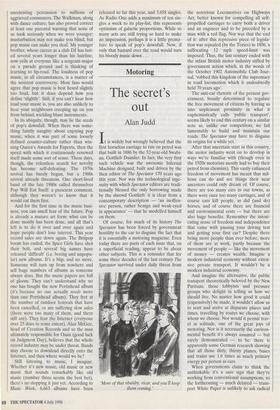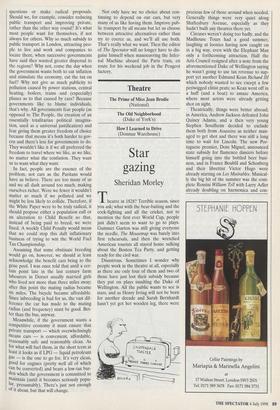Motoring
The secret's out
Alan Judd
It is widely but wrongly believed that the first horseless carriage to run on petrol was that built in 1886 by the 52-year-old Swabi- an, Gottlieb Daimler. In fact, the very first such vehicle was the awesome Infernal Machine designed, built and driven by the then editor of The Spectator 170 years ago this year. Nor was the technological inge- nuity with which Spectator editors are tradi- tionally blessed the only borrowing made by the shrewd Gottlieb: it is clear from a contemporary description — 'an inoffen- sive person, rather benign and weak-eyed in appearance' — that he modelled himself on them.
Of course, for much of its history The Spectator has been forced by government hostility to the car to disguise the fact that it is essentially a motoring magazine. Even today there are parts of each issue that, on a superficial reading, appear to be about other subjects. This is a reminder that for some three decades of the last century The Spectator survived under daily threat from More of that ribaldry, vicar, and you'll keep them coming.' the notorious Locomotives on Highways Act, better known for compelling all self- propelled carriages to carry both a driver and an engineer and to be preceded by a man with a red flag. Nor was that the end of it: after this repressive piece of legisla- tion was repealed (by the Tories) in 1896, a suffocating 12 mph speed-limit was imposed. Thus, the last century ended with the infant British motor industry stifled by government action which, in the words of the October 1902 Automobile Club Jour- nal, 'robbed this kingdom of the supremacy in road locomotion which it undoubtedly held 70 years ago'.
The anti-car rhetoric of the present gov- ernment, bossily determined to regulate the free movement of citizens by forcing us into unpleasant proximity in what it euphemistically calls 'public transport', seems likely to end this century on a similar note as, unlike our competitors, we fail lamentably to build and maintain our roads. The Spectator may have to disguise its origins for a while yet.
After that uncertain start in this country, the motor industry went on to develop in ways we're familiar with (though even in the 1920s motorists mostly had to buy their petrol from chemists). This vastly enhanced freedom of movement has meant that mil- lions can do and see things their near ancestors could only dream of. Of course, there are too many cars in our towns, as there were once too many carriages, and of course cars kill people, as did (and do) horses, and of course there are financial and environmental costs — but there are also huge benefits. Remember the intoxi- cating sense of freedom and independence that came with passing your driving test and getting your first car? Despite there being more people than ever before, more of them are at work, partly because the movement of people — like the movement of money — creates wealth. Imagine a modern industrial economy without exten- sive private transport. It wouldn't be a modern industrial economy.
And imagine the alternative, the public transport theoretically beloved by the New Puritans, those lobbyists and pressure groups who delight in telling us how we should live. No matter how good it could (expensively) be made, it wouldn't allow us to start and arrive at disparate places and times, travelling by routes we choose, with whom we choose. Nor would it permit trav- el in solitude, one of the great joys of motoring. Nor is it necessarily the environ- mental benefit it's always assumed — but rarely demonstrated — to be: there is apparently some German research showing that all those dirty, thirsty planes, buses and trains use 1.6 times as much primary energy per person as cars.
When governments claim to think the unthinkable it's a sure sign that they're working from conventional assumptions, so the forthcoming — much delayed — trans- port White Paper is unlikely to ask radical questions or make radical proposals. Should we, for example, consider reducing public transport and improving private, rather than the other way round? It's what most people want for themselves, if not always for others. Why so much subsidy to public transport in London, attracting peo- ple to live and work and companies to locate there, when successive governments have said they wanted greater dispersal to the regions? Why not, come the day when the government wants both to cut inflation and stimulate the economy, cut the tax on fuel? Why not give as much publicity to pollution caused by power stations, central heating, boilers, trains and (especially) planes as to that caused by cars? Because governments like to blame individuals, that's why. All governments fear people (as opposed to The People, the creation of an essentially totalitarian political imagina- tion, used as a universal justification) and fear giving them greater, freedom of choice because that means it's both harder to gov- ern and there's less for governments to do. They wouldn't like it if we all preferred the freedom to travel where we like, as we like, no matter what the confusion. They want us to want what they want.
In fact, people are the essence of the problem, not cars as the Puritans would have us believe. There are too many of us and we all dash around too much, making ourselves richer. Were we fewer it wouldn't matter so much if we polluted and we might be less likely to collide. Therefore, if the White Paper were to be truly radical, it should propose either a population cull or an alteration to Child Benefit so that, instead of being paid to breed, we were fined. A weekly Child Penalty would mean that we could stop this daft inflationary business of trying to win the World Fuel Tax Championship.
Assuming that some obstinate breeding would go on, however, we should at least acknowledge the benefit cars bring to the gene pool. I was once told that until a cer- tain point late in the last century farm labourers in Dorset usually married girls who lived not more than three miles away; after this point the mating radius became six miles. The bicycle became affordable. Since inbreeding is bad for us, the vast dif- ference the car has made to the mating radius (and frequency) must be good. Bet- ter than the bus, anyway.
Meanwhile, if the government wants a competitive economy it must ensure that private transport — which overwhelmingly means cars — is convenient, affordable, reasonably safe and reasonably clean. As for what will fuel them, in the short term at least it looks as if LPG — liquid petroleum gas — is the one to go for. It's very clean, good for engines (pretty well all of which can be converted) and bears a low-tax bur- den which the government is committed to maintain (until it becomes seriously popu- lar, presumably). There's just not enough of it about, but that will change. Not only have we no choice about con- tinuing to depend on our cars, but very many of us like having them. Improve pub- lic transport by all means but let us choose between attractive alternatives rather than try to coerce us, and we'll all use both. That's really what we want. Then the editor of The Spectator will no longer have to dis- guise himself when manoeuvring the Infer- nal Machine aboard the Paris train, en route for his weekend job in the Peugeot factory.















































































































 Previous page
Previous page